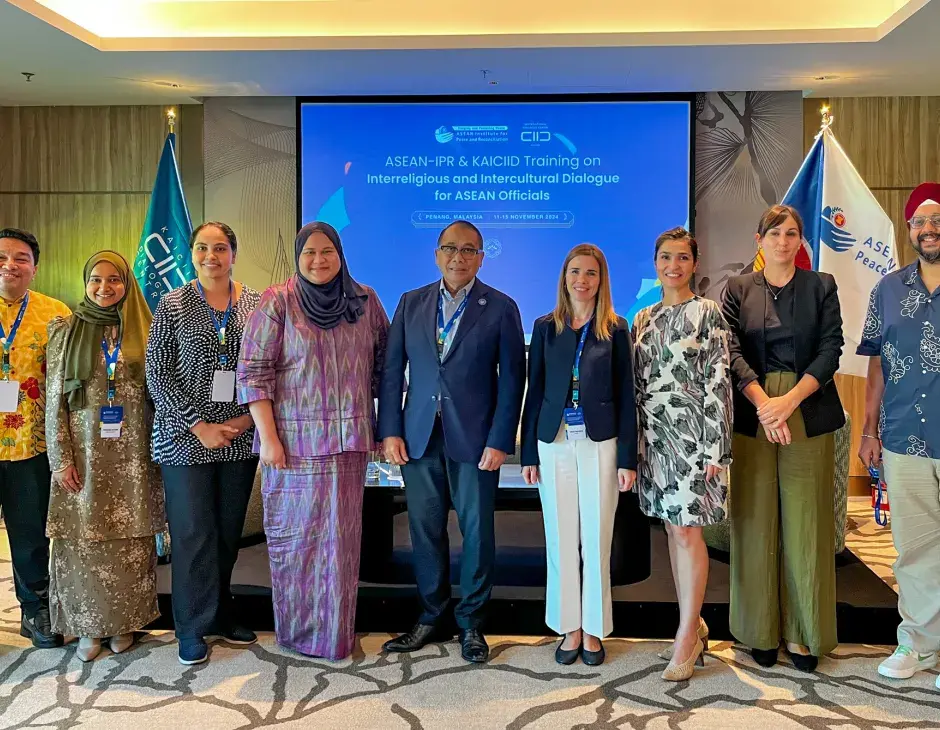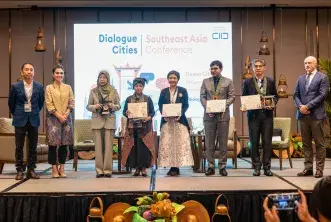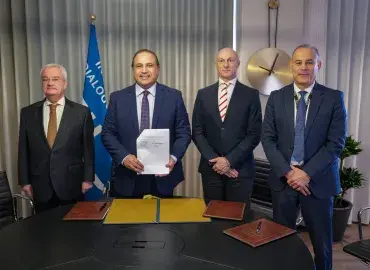KAICIID & ASEAN-IPR Lead Training on Interreligious And Intercultural Dialogue For ASEAN Officials
KAICIID is proud to have co-organized the ASEAN-IPR Training on Interreligious and Intercultural Dialogue (IRD-ICD) for ASEAN officials, held from 11 to 15 November 2024 in Penang, Malaysia. This initiative underscores our commitment to fostering interreligious and intercultural understanding as tools for conflict prevention, peacebuilding, and social cohesion.
In her Welcome remarks, Ms. Vera Ferreira, KAICIID’s Head of Regional Programmes, highlighted KAICIID’s philosophy: “Dialogue has the power to transform how we see the world, how we engage with each other, and how we contribute to building more peaceful and cohesive societies. It is a tool, a process, an approach, and a way of life.”
“We are truly proud to be home to some of the most diverse countries in the world – whether culture, race, language, faith or religious beliefs. However, this could be a double-edged sword – as plurality may pose challenges of inter-communal tensions or conflict, potentially posing a significant threat to our regional peace and prosperity. Thus, it is truly pertinent for all of us to foster interreligious and intercultural dialogue and utilize it to our advantage to bridge gaps, respect diversity and plurality, and build trust for conflict prevention, conflict resolution, and peaceful coexistence,” remarked the Executive Director of ASEAN-IPR, I Gusti Agung Wesaka Puja, during the opening ceremony.
This year’s Training, a collaborative effort, brought together 23 participants from ASEAN Member States and ASEAN bodies/entities. The program was anchored on the Training Module co-developed by experts from the region and KAICIID, drawing from KAICIID’s extensive source materials tailored to the region's specific needs and characteristics.
Ms. Nurul Amirah, a participant from the ASEAN Inter-Parliamentary Assembly (AIPA) Secretariat, praised the training for its “perfect blend of knowledge and hands-on practice. It is well-structured, engaging, and offered great networking opportunities. I feel more confident and equipped with tools to apply in my work.”
Throughout the five-day program, participants explored essentials of dialogue, conflict analysis, transformation, and peacebuilding frameworks. Interactive sessions included role-play, simulations, and mentoring, culminating in site visits to Penang’s iconic places of worship such as the Kuan Yin Temple, Kapitan Keling Mosque, Church of Assumption, Sri Mahamariamman Temple, and Wadda Gurdwara Sahib.
“The Training was both comprehensive and interactive. Beyond delivering valuable material, it brought learning to life through role-playing various dialogue strategies,” said Ms. Fidia from ASEAN Foundation. She emphasized the training’s importance “for enhancing our daily interactions and fostering meaningful connections.”
Another participant, Mr. Ekto Vongphakdy of the Permanent Mission of Lao PDR to ASEAN, reflected on the challenges of fostering dialogue: “ helping individuals transition from their comfort zones to a dialogue zone, and from an anxiety zone to a stretch zone. The main challenge lies in how we can embody core values – compassion, deep listening, and non-judgment – using non-violent communication to create meaningful and respectful dialogue.”
Led by Dr. Charanjit Kaur Darshan Singh and supported by a team of trainers including Ms. Nabiela Ismail (Malaysia), Prof. Pablito Baybado (Philippines), Mr. Malminderjit Singh (Singapore), Ms. Vera Ferreira (KAICIID), Ms. Mitra Modaressi (KAICIID), and Ms. Arijana Aganovic (KAICIID), the program included lectures, case studies, and interactive activities. Dr. Charanjit noted, “Through a well-structured blend of lectures, case studies, and hands-on activities, the training provided participants with practical strategies directly applicable to their roles.”
Dr. Charanjit also emphasized that the facilitators’ openness created a rich learning environment: “A key strength of the program was its focus on real-world experiences. This approach fostered a genuine sense of community and openness, essential for such dialogue-focused training.”
The program was endorsed by the Ministry of Foreign Affairs of Malaysia. At the close of the Training, Mrs. Nur Nadiah Hidayat (Director, APSCD, ASEAN-Malaysia National Secretariat, Ministry of Foreign Affairs of Malaysia) lauded Penang as a reflection of interreligious and intercultural dialogue. “The values of respect, mutual understanding, and cooperation are reflected in the daily lives of the people here. These values are at the heart of what we hope to achieve in ASEAN, creating a region where differences are celebrated, where communities thrive in peace, and where collaboration across cultures and religions leads to greater prosperity for all.”
As Malaysia assumes the ASEAN Chairmanship in 2025, the nation reaffirms its role in advancing interreligious and intercultural understanding across the region, with KAICIID as a committed partner in this endeavour.
For more information about KAICIID and ASEAN – IPR collaboration, please visit the respective websites
(www.kaiciid.org & www.asean-aipr.org ) and follow our social media platforms.
The International Dialogue Centre – KAICIID and the Association of Southeast Asian Nations Institute for Peace and…



